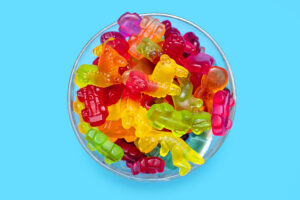Recently the news media recorded overdoses from sleep gummies, that’s why the warning: don’t buy gummies sold as sleep-aids. When a customer with sleep problems hears of a sleep-aid that is available over the counter, he or she may think that this sleep-aid likely is safe. However, this is not what a recent study discovered. The sleep gummies contained mostly a mixture of cannabidiol (CBD) and melatonin with wildly varied doses. The JAMA medical journal published the original study of gummies that contained CBD.
Unsafe doses of melatonin in children’s sleep gummies
Study coauthor Dr. Pieter Cohen is an associate professor from Cambridge Health Alliance in Somerville, Massachusetts. He said: “One product contained 347% more melatonin than what was actually listed on the label of the gummies.” In the study researchers sent 25 different brand names of sleep gummies to outside labs. They wanted to determine the content of melatonin and CBD. 88% of the gummies had inaccurate labels, and only three contained a quantity of melatonin within 10% of what was listed on the label.
High doses of melatonin in children can lead to drowsiness, headaches, agitation, and increased bed-wetting. The National Center for Complementary and Integrative Health, a department of the National Institutes of Health, describes safety concerns with high doses of melatonin in children. The accepted dose for children at bedtime is only 0.5 to 1 mg of melatonin.
Melatonin is a hormone
The pineal gland deep in the brain produces melatonin and the brain releases only small amounts before we fall asleep every night. Children develop side effects when parents administer higher melatonin doses. Melatonin can also interact with medications and cause allergic reactions to the melatonin as the National Center for Complementary and Integrative Health points out. At the same time, the agency warns, melatonin supplement in children can affect hormonal development. This includes puberty, menstrual cycles, and the overproduction of the hormone prolactin. Prolactin causes breast and milk development in women.
Is CBD safe for children?
The FDA sent warning letters to 15 companies that were selling cannabidiol products including for use in children. There is currently no indication for the use of CBD in children. The only exception are intractable seizures in children over the age of 1. In this case the FDA allows the use of CBD. But the FDA prohibits all other applications of CBD including sleep gummies for children. Nevertheless, many companies advertised sleep gummies containing melatonin and CBD as “safe” for children, when they were not.
Conclusion
Many parents think that sleep gummies are safe for their children. But a study published in the JAMA journal examined 25 brands of sleep gummies. They found that the concentration of melatonin exceeded the limit in 88% of the sleep gummies. Also, the sleep gummies contained various amounts of CBD, although the FDA had previously stated that CBD use in children is prohibited. Parents who want to occasionally supplement their children with melatonin should do so with melatonin oral solution. This is easy to dosage and avoids CBD contamination. The labeling of sleep gummies is misleading and they have inconsistent concentration of melatonin between various manufacturers. Parents who are concerned about the well- being of their kids best avoid sleep gummies!







